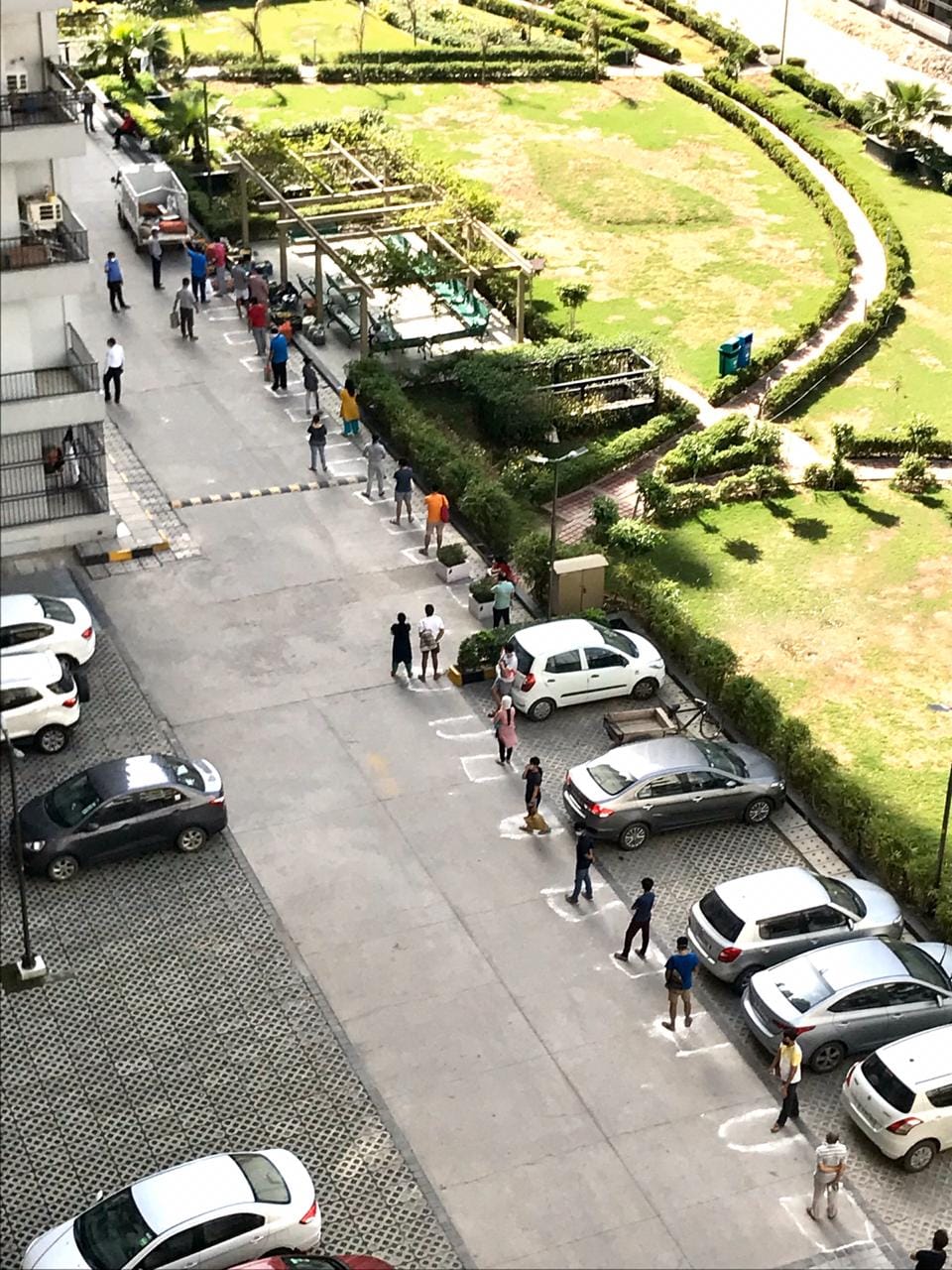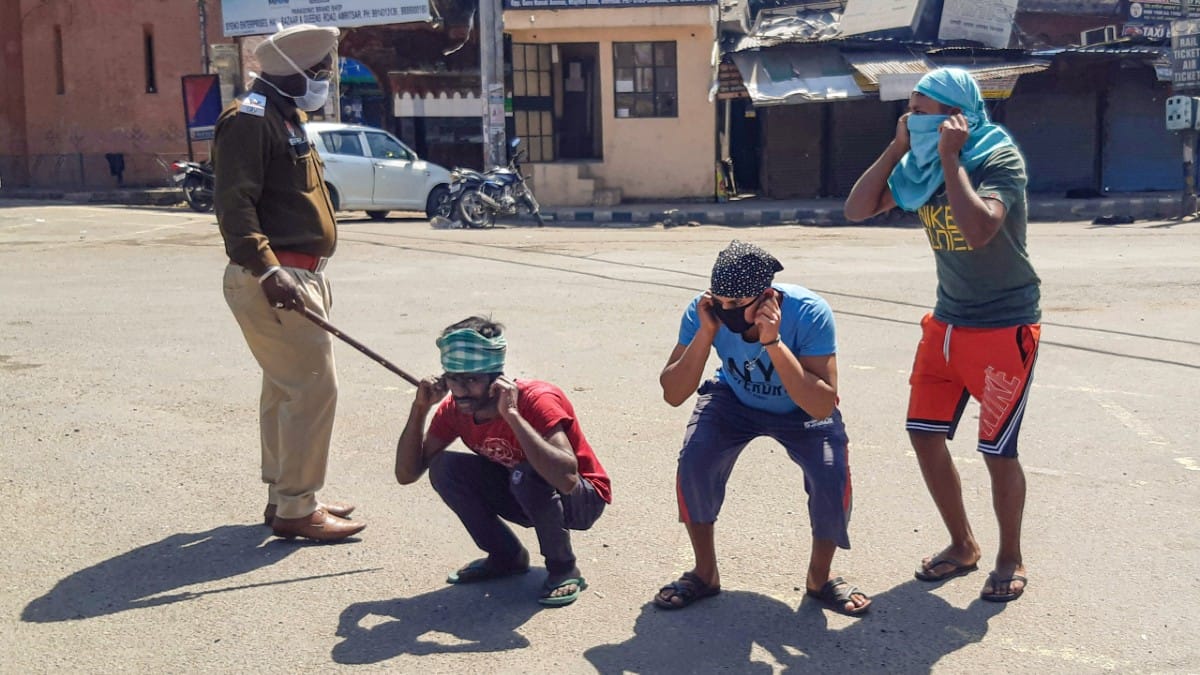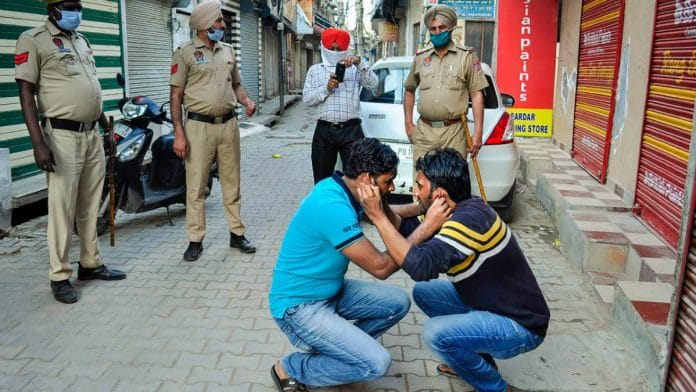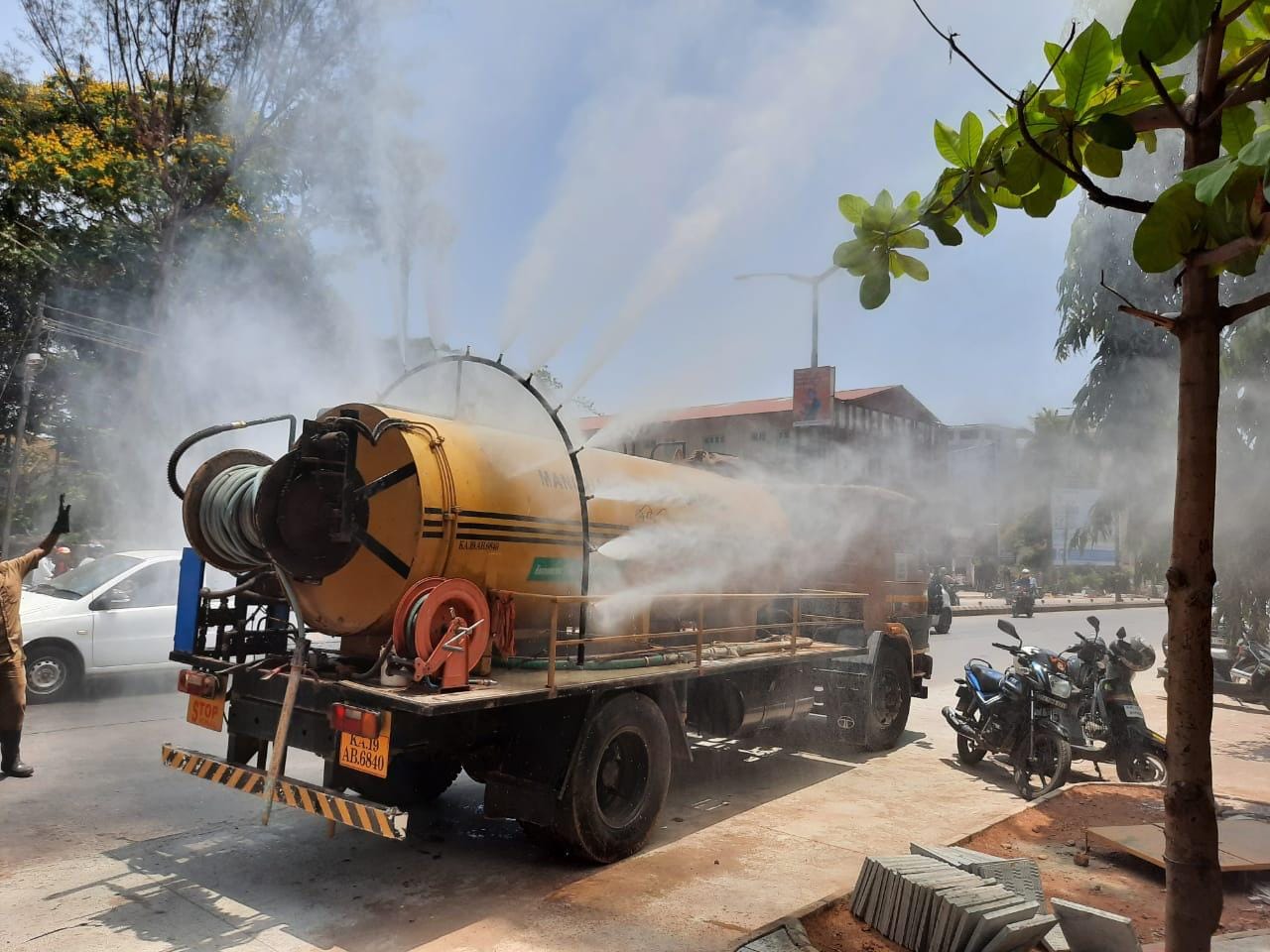New Delhi: Prime Minister Narendra Modi held a video conference with the chief ministers of various states Monday to plan an effective exit strategy for the nationwide lockdown when it comes to an end on 3 May.
The almost six-week lockdown was imposed on 24 March to arrest the spread of Covid-19 by the prime minister. People were advised to stay at home and self-isolate to avoid the infection. However, many continued to violate restrictions and the police came up with some innovative solutions to deal with them.
ThePrint brings you a roundup of some of them:
Frog jumps & fear of Yamraj
To punish people who were found violating the lockdown in Saharanpur, the Uttar Pradesh police made the men do frog jumps in a single line. The police also went around the city wearing coronavirus helmets with a man dressed as Yamraj, the Hindu god of death, by their side, who warned people to go into their homes.
बिन बरसात वाले मेंढक #सहारनपुर #लॉकडाउन pic.twitter.com/QIXXbjuQUq
— Sachin Gupta | सचिन गुप्ता (@sachingupta787) April 27, 2020
#सहारनपुर में सड़क पर उतरे 'कोरोना' और 'यमराज'
पब्लिक को चेताया, सुधर जाओ…@Uppolice pic.twitter.com/onliFCvo2M
— Sachin Gupta | सचिन गुप्ता (@sachingupta787) April 27, 2020
Taking a cue from the UP Police, even the Delhi Police made someone dress up as Yamraj and went around in a police jeep in Delhi’s RK Puram area and told people to stay inside to prevent the spread of coronavirus.
Delhi Police,with the help of a local artist dressed as Yamraj,created awareness among the people and appealed to them to remain indoor during lockdown.Announcement was made by them for the people in RKPuram area,in a bid to create awareness. #COVID19 @DelhiPolice
???? ?❤ pic.twitter.com/RM8CUcae20
— KARTIK?? (@aap_kartik) April 27, 2020
An ‘aarti’ for violators
The Uttar Pradesh police clearly has many tricks up its sleeves to punish those violating the nationwide lockdown. On 22 April, they performed aarti for lockdown violators in Kanpur’s Kidwai Nagar and also showered them with flowers and gave them bananas.
#WATCH: Police perform 'aarti' of people who violated #CoronavirusLockdown norms at Kidwai Nagar in Kanpur. pic.twitter.com/crm5w3s9JZ
— ANI UP (@ANINewsUP) April 22, 2020
Fake Covid-19 patients
In North Chennai, the police made the men violating the lockdown, assemble in a circle and walk backwards. The Tamil Nadu Police also put violators in an ambulance with fake Covid-19 patients to scare them and make them understand the gravity of the infection.
In North Chennai, police find a new way to punish those who violate the lockdown #CoronaLockdown #COVID2019india pic.twitter.com/qos6jYGtiE
— Poornima Murali (@nimumurali) April 27, 2020
Tamil Nadu Police at work. What an idea ?? lockdown violators put in an ambulance with fake COVID patient pic.twitter.com/zTbaON3bEy
— Snehesh Alex Philip (@sneheshphilip) April 24, 2020
Teenager stuffs friend in suitcase to try and sneak him into apartment
In Mangalore, a teenage student was reportedly caught trying to sneak his friend into a residential complex by stuffing him in a suitcase.
Frustrated by the rules of the building complex disallowing any outsiders inside the area due to the Covid-19 pandemic, the student tried to sneak his friend inside a suitcase. However, people got suspicious when they saw the suitcase move as he was dragging it. The residents asked the boy to open the suitcase and found his friend inside. The two boys were then taken to a police station where their parents were also summoned.
Also read: Saturday Night Live returns with surprise host Tom Hanks and a remote episode on Zoom
When foreigners were made to write ‘I am sorry’ 500 times
Ten foreigners were made to write ‘I did not follow the lockdown rules, I am sorry’ 500 times by the police for violating the Covid-19 lockdown rules. These foreign nationals, from the US, Australia, Mexico and Israel, were caught taking a stroll on the banks of the Ganga in Rishikesh.
The police in Rishikesh further directed hotels to allow the guests to step out only if they are accompanied by local helpers. Those not following the order could face legal action, they said.
Health official in Andhra Pradesh drinks sanitiser by mistake
A health department official in Andhra Pradesh was rushed to hospital after he drank from sanitiser bottle, mistaking it for water.
According to reports, Anil Kumar, a medical officer from Anantapur, unknowingly drank hand sanitiser while on a call. He was then rushed to the local hospital where he is undergoing treatment. Anantapur MLA Anantha Venkatrami Reddy also visited Kumar in hospital.
‘Corona sandesh’ and ‘Corona cake’ at Kolkata sweet shops
A popular sweet shop chain in Kolkata, Hindustan Sweets, has made ‘Corona Sandesh’ and ‘Corona cakes’, designed and modelled after the molecular structure of the novel coronavirus to “create awareness among people about the deadly pandemic”. The corona cake and sandesh have been placed along with the other sweets in the shop and are being distributed free of cost.
An official of Hindustan Sweets at its headquarters in South Kolkata’s Jadavpur said, “Corona sandesh is not for sale. We are handing it out to all our customers for free as part of our social duty to make people aware about the dangerous viral infection.”
Man in Kerala files writ petition for cat food
N. Prakash, a Kerala resident, filed a writ petition in Kerala High Court after he was denied a vehicle pass to purchase feed for his three pet cats.
In his petition, Prakash said his cats only consumed a certain brand of biscuits called ‘Meo-Persian’, which had a non-vegetarian component. Since he was vegetarian, he had to buy the special cat food from the Cochin Pet Hospital.
After hearing his plea, the court ruled in favour of the three felines and ordered that the pass be given to him. Towards the end of the judgment, the court remarked, “We might observe, in a lighter vein, that while we are happy to have come to the aid of the felines in this case, we are also certain that our directions will help avert a ‘CATastrophe’ in the petitioner’s home”.
A coronavirus fruit in Mysuru for protection
Amid the clapping of hands, beating of plates and lighting of lamps, a village in Mysuru called Rammanahalli has come up with a unique way to keep coronavirus away — with a fruit.
Every house in the village has hung a green poisonous fruit called beli mullina kaayi or datura, which bears a vague resemblance to the molecular structure of Covid-19, at their entrance. The belief is that poisonous weed will ward off the virus that has killed people across the world. They have also re-named it corona kaayi (corona fruit).
Mysuru has recorded 28 cases of coronavirus so far and the numbers are expected to rise. The government has been trying hard to fight such superstitions and blind beliefs but the fear of the spread of the virus is forcing people to resort to such ‘organic’ measures.

Medical student demands eggs and Maggi from PM Modi, gets them in 30 mins
Soumya Singh, a medical student from Karnataka’s Mangaluru, was faced with an acute food crisis amid the lockdown and decided to tweet out to Prime Minister Narendra Modi, asking for Maggi and eggs.
Her tweet caught the eye of Rakesh Singh, Additional Chief Secretary of the Karnataka Urban Development Department, who informed the Covid-19 war room in Dakshina Kannada district. Area MP Nalin Kumar reportedly asked war room supervisor Pradyumna Rao to ferry the supplies to her.
The food supplies landed at Singh’s doorstep in less than 30 minutes — for free.
Also read: Covid-19 put brake to academic activity, but digital libraries can ensure continuity
Statue of Unity for sale on OLX
With doctors across the country facing an acute shortage of Personal Protective Equipment (PPEs), which are vital for protection against Covid-19, an anonymous user put up an advertisement on online marketplace OLX trying to sell the Statue of Unity for Rs 30,000 crore to raise money for health care services.
The Statue of Unity is the world’s largest statue of Sardar Vallabhbhai Patel, India’s first deputy prime minister, in Gujarat. The post on the site read, “Emergency! Selling Statue of Unity because of urgent money required for the hospitals and healthcare requirement.”
The police, soon, tracked the user in Gujarat and registered a case under Indian Penal Code Sections 505 for publishing or circulating rumours, 417 for cheating and 469 for forgery.
A haunting ‘diya’ moment on 5 April
While Indians were lighting diyas and candles to express their solidarity against the coronavirus pandemic Sunday, an unidentified individual from Bangalore decided to take things up a notch by dressing up as a ghost and walking around his or her balcony while the eerie song ‘Gumnaam Hai Koi’ from the 1965 Hindi thriller ‘Gumnaam’ played in the background.
Best performance ??????
(Got this on WhatsApp. Apparently in Bangalore.) pic.twitter.com/lO5BDy0bjR
— Manisha Pande (@MnshaP) April 5, 2020
Man held for smuggling alcohol in milk cans
With access to alcohol severely limited due to the nationwide lockdown, many people have reportedly taken up quirky ways to hide and smuggle alcohol. Some are hiding the bottles inside LPG cylinders, while a man from Uttar Pradesh was caught by the police for trying to smuggle liquor bottles in the garb of milk bottles. He was caught near Rashtrapati Bhavan with four cans of milk, which contained seven whisky bottles.
Also read: WhatsApp puts new cap on forwarded messages to counter Covid-19 rumours
Game of hopscotch
Outside several grocery stores in parts of Gujarat, Delhi, Maharashtra, Jammu, West Bengal and Kashmir, circles were drawn on the ground in front of shops to indicate where customers could stand while ensuring a safe distance from others.
ThePrint reporter Regina Mihindukulasuriya observed that a grocery store in South Delhi’s Amar Colony allowed customers inside only one at a time around 8pm on 24 March even though the space was large enough to safely accommodate around seven people. A Kotak Mahindra ATM in the same area limited withdrawals to Rs 3,000.

In Jammu and Kashmir’s Ganderbal district, a police superintendent was making sure people in queues maintained enough distance from each other.
An SP rank official of @JmuKmrPolice whilst guiding people of Ganderbal about #Social_Distancing, carefully marking their footsteps in an equidistant manner. #IndiaFightsCOVID19 pic.twitter.com/yij0KGEK3n
— ?? ?????? ???? (@DrSuneem) March 23, 2020
Sit ups, shaming & lathi treatment
In Ludhiana, those found flouting curfew rules and venturing out were forced to do sit-ups by the police, who said they used mild force according to a news report. In Kanpur and Bareilly, a group of boys were made to do 10 sit-ups. “People who violate the lockdown order are being made to do sit-ups just to realise their mistake,” a police officer told ThePrint in Lucknow. “We are not mishandling them, but they have to understand the present scenario,” he added.
Punjab Police resorted to light caning and public humiliation of curfew violators. Several video surfaced in which police were making people do sit ups, scramble on their hands and knees as well as lie down on the ground and roll over several times in opposite directions. Vehicles of those caught were impounded.
In Chandigarh, at least two colonies where people from lower income groups live, police was seen caning those who came out of their homes.

In Uttar Pradesh, state police made a self-styled spiritual guru, who goes by the name Maa Aadi Shakti, call off a gathering. In a video posted to Twitter, the woman can be seen resisting the police and holding a sword while people supported her from behind. The police eventually lathi-charged to break up the event and disperse crowds.
A perspective on how tough it is for @Uppolice to enforce #21daylockdown. in Deoria , this self styled god woman ‘Maa Aadi Shakti’ refused to call off a religious gathering , pointed sword at cops etc . Finally , it took a ‘mild’ lathicharge to disperse everyone . Crazy stuff ! pic.twitter.com/MPe4F9imkB
— Alok Pandey (@alok_pandey) March 25, 2020
‘Enemy of the state’
Police in Meerut tried to ‘shame’ those flouting the rules. Those caught out and about were handed a paper that read: “Mai samaj ka dushman hoon. Mai ghar pe nahi rahoonga (I am an enemy of society. I will not stay at home).”
Banners at borders
ThePrint’s photojournalist Praveen Jain spotted a large banner set up by Uttar Pradesh Police on the Noida-Delhi border that read “MEDIA AMBULANCE DOCTOR”. What this actually reads as is ‘media, ambulance, doctor’ to indicate only essential services will be permitted to travel.

Disinfectant drive
In Kerala’s Wayanad, motorists were made to stand in line so police could spray disinfectants on them. Police officials say the sanitation drive will help “break the chain” of transmission, which is necessary to limit the spread of the virus.
With over 100 active cases of coronavirus, Kerala currently has the highest tally in the country. Wayanad shares its border with Karnataka, where 44 cases have been registered.
Mass sanitisation
The administrative body of the Greater Bangalore metropolitan area plans to take up a massive sanitisation drive by spraying disinfectant in areas where infection cases were found. The civic body wants to use trucks, “jetting machines” and the fire department’s fire extinguishing vehicles to carry out the exercise.
“The BWSSB (Bangalore Water Supply and Sewerage Board) has provided us temporarily with 10 jetting machines with each vehicle having a capacity of 7,000 litres … the spraying of disinfectant will be taken up across the city,” said Mayor Goutham Kumar.
“In the interest of public health and safety our personnel have been spraying Sodium hypochlorite solution as a disinfectant around public places,” he added.
The fire department in the districts of Bengaluru, Mangaluru, Kolar and Kalburgi among others, were pressed into action to spray water mixed with disinfectants across all major roads.
The copy was updated to add more incidents reported across the country.
Also read: 21-day lockdown: Yogi flouts, Gehlot supports, Gul Panag questions, Anurag Kashyap ‘thanks’ PM








Definitely there is divergence between the guidelines issued by the Disaster Management Authority and the implementation on the streets. Typically, the police and civic authorities don’t read the written instructions, or not sufficiently educated to do so. In any case, once you put a uniform on a person and give him a stick, he or she tends to use it. In 1896, under the British rule, there was plague outbreak in Pune. The quarantine enforced by the British was so harsh, Lokmanya Tilak continuouly protested against the oppressive methods adopted by the British. When the British rulers did not yield, the Chapekar Brothers assasinated the local administrator Rand.